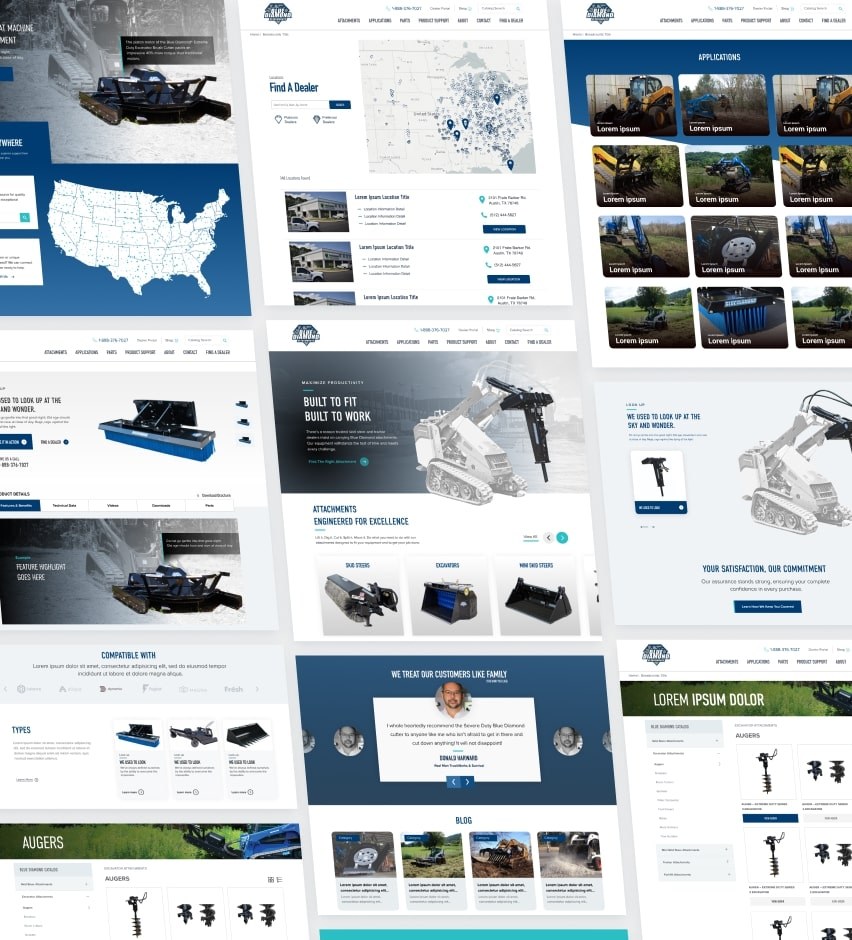

B2B Marketing Stats and Emerging Trends in 2025
Read the latest statistics and data for insights on B2B marketing trends across the digital landscape.
Key Takeaways
The Digital Shift in B2B Marketing: Traditional marketing methods are being replaced by digital-first strategies as buyers increasingly rely on online research, and businesses leverage new technology and insights to optimize complex, multi-stage sales cycles.
Content Marketing's Role: Content, especially video, is crucial for B2B. In 2024, 69% of marketers say they are investing in video, with revenue from content marketing projected to reach $107 billion by 2026.
AI's Marketing Impact: Artificial Intelligence is transforming content creation and lead generation. In 2024, 85% of marketers report AI-driven content strategies, with 57% using AI chatbots for deeper insights.
Jump to Statistics for
Technological advancements, evolving buyer behaviors, and the critical role of data-driven strategies are driving significant shifts in B2B marketing.
B2B businesses with their long sales cycles and complex customer journeys must tightly integrate their technology, behavioral insights, and strategic planning to stay competitive and drive growth.
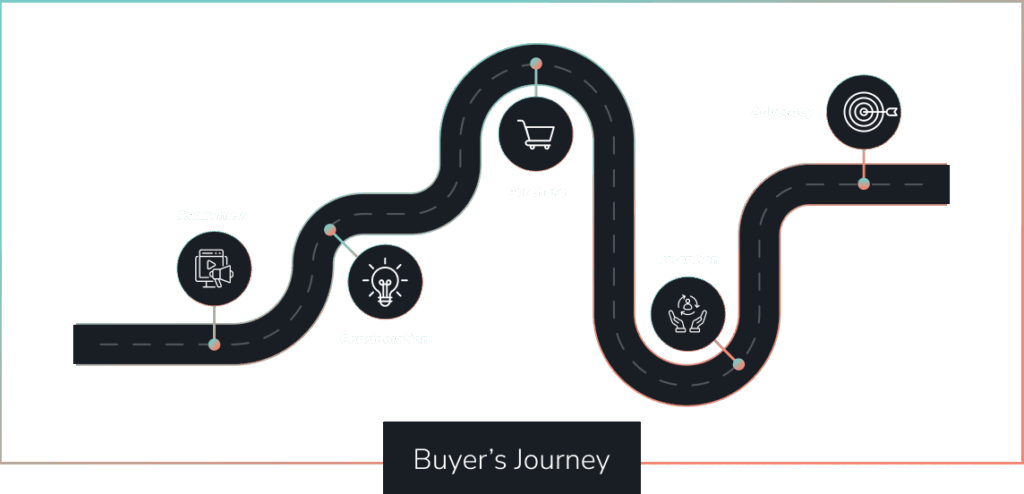
Accordingly, traditional marketing methods are slowly being replaced with digital strategies as these brands strive to meet the sophisticated demands of modern B2B buyers, who are now spending more time online, researching and purchasing business solutions in ways that were unimaginable just a few years ago.
These changes underscore the necessity for B2B marketers to stay informed about the latest trends and statistics in their industry. By leveraging these insights, B2B businesses can refine their marketing strategies, better understand their target audiences, and allocate marketing resources more effectively.
This article compiles the most recent and relevant B2B marketing statistics for 2024. It offers a comprehensive overview of current industry trends, customer behaviors, and best practices for growing demand, awareness, and sales in B2B sectors.
B2B Marketing Statistics
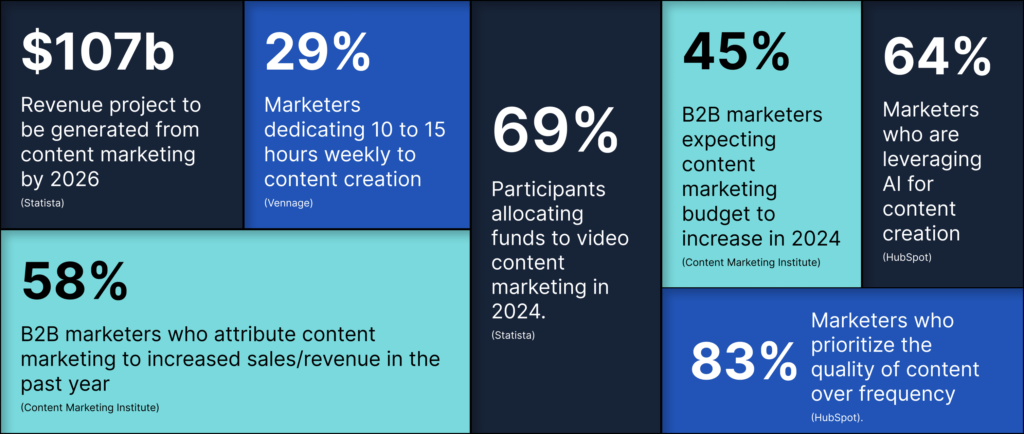
Content marketing remains a cornerstone of B2B sales strategies. Great content captures top-of-funnel prospects, positions brands as thought leaders, drives engagement, and delivers value for targeted audiences.
In 2024, the focus on creating high-quality, relevant marketing content continues to grow, as B2B businesses recognize its vital role in attracting and retaining new customers. Here are some notable statistics that demonstrate this trend:
- In a global survey conducted in July 2023 among B2B marketers, 69% of participants anticipated allocating funds to video content marketing in 2024. Additionally, 21 percent mentioned plans to invest in digital events, while 47 percent highlighted in-person events as an investment area (Statista).
- 45% of B2B marketers expect their content marketing budget to increase in 2024, with significant investment expected in video content (69%) and thought leadership (53%) (Content Marketing Institute)
- Content marketing is projected to generate $107 billion in revenue by 2026, up from the current $82.3 billion as of 2024 (Statista).
- Nearly 34.3% of marketers are dedicating between 10 to 15 hours per week to content creation (Venngage).
- HubSpot reports that 83% of marketers believe prioritizing the quality of content is more beneficial than posting frequently (HubSpot).
- Notably, 58% of B2B marketers reported increased sales/revenue due to content marketing in the past year (Content Marketing Institute).
- Currently, 64% of marketers are leveraging AI for content creation (HubSpot).
Extra Stats
- 90% of marketers using short-form video plan to increase or maintain their investment in 2023, recognizing it as one of the most powerful content formats with the highest ROI (HubSpot).
- 65% of B2B buyers report that they find short-form content, such as blog posts and infographics, the most engaging (Demand Gen Report).
- 14% of B2B buyers consider video the most valuable content type during the decision-making process (Isoline Comms).
- In the past three months, 88% of B2B buyers have watched video content to learn about products or services. Whether hosted on websites or YouTube, a significant portion of content consumption in the B2B space is now video-driven (Brightcove)
AI Marketing Statistics
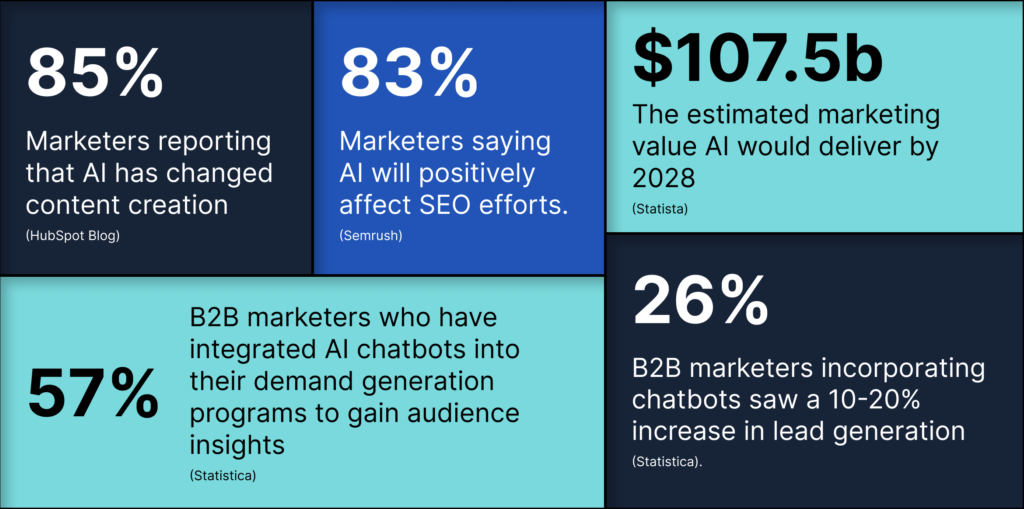
Artificial intelligence tools enhance audience engagement and support better decision-making in marketing. However, it's crucial to use these tools carefully to avoid missed opportunities or ineffective strategies. Success requires responsible and informed usage, ensuring AI supports human insight and creativity and doesn’t drive it.
- In 2024, 85% of marketers report that generative AI has changed how they create content, with 63% expecting most content to be created with AI assistance (HubSpot Blog).
- 83% of marketers believe AI will positively impact their SEO efforts. AI assists marketers in creating high-quality, SEO-optimized content, improving efficiency and effectiveness in digital marketing campaigns (Semrush).
- By 2028, AI in marketing is estimated to be valued at more than 107.5 billion dollars (Statista)
- In the United States, 57% of B2B marketers have integrated AI-enabled chatbots into their demand generation programs to gain deeper insights into their audience (Statista).
- In the U.S., 26% of B2B marketers who incorporated chatbots into their marketing strategies saw a 10-20% increase in lead generation volumes (Statista).
Extra Stats and Trends
- A recent Gartner survey (Jan–Mar 2024) found that sellers who leverage AI tools are 3.7x more likely to meet their quotas than those who don’t.
- 76% of marketers are confident in AI's potential to enhance their professional tasks in the future. (Pipedrive).
- Marketers are actively adopting AI for its potential to boost productivity (76%) and improve customer engagement (52%) (DemandSpring).
- Half of B2B marketing leaders currently use AI, and 75% are likely to adopt generative AI for business promotion as AI-driven advertising grows. (The B2B Marketing Benchmark Report).
- 67% of B2B companies use AI for product recommendations, 42% for pricing optimization and customer segmentation, 46% for chatbots and virtual assistants, and 33% for product categorization (Striped Giraffe).
- 57% of B2B companies are leveraging generative AI to produce more content in less time. B2B marketers are automating tasks with generative AI to free up time for higher-value activities. Additionally, 41% of marketers use generative AI to craft more creative campaigns, while 35% apply it to gain a competitive edge (The B2B Marketing Benchmark Report).
- The global artificial intelligence market is expected to reach $407.0 billion by 2027, with a compound annual growth rate (CAGR) of 36.2% from 2022 to 2027. (MarketsandMarkets™).
B2B Email Marketing Statistics
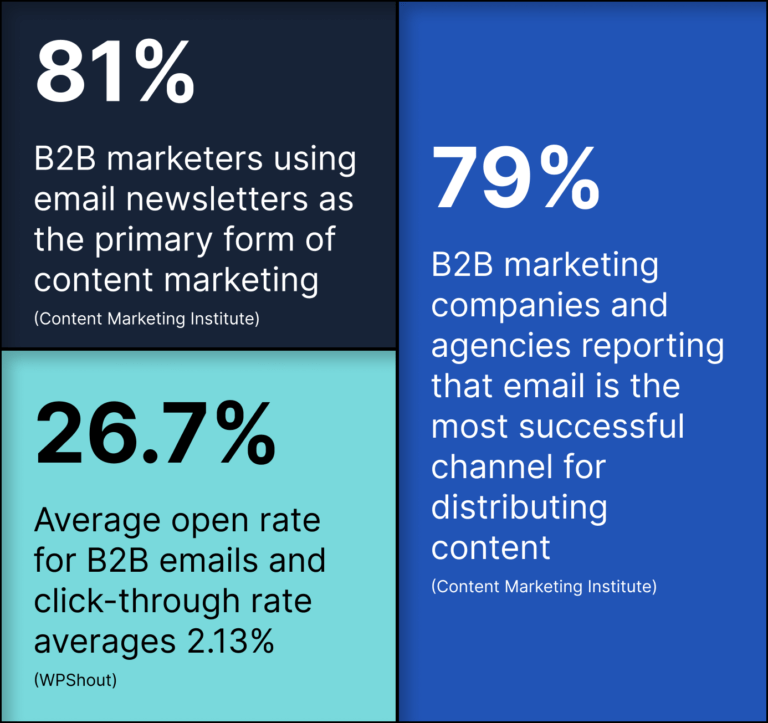
Email marketing remains a cornerstone of B2B strategies, offering high ROI and personalization opportunities. Discover the latest trends driving its effectiveness in today's market.
- 81% of B2B marketers use email newsletters as the primary form of content marketing (Content Marketing Institute).
- The average open rate for B2B emails is 26.7%, and the click-through rate averages 2.13% (WPShout).
- As of 2023 about 79% of B2B marketing companies and agencies report that email is their most successful channel for distributing their content (Content Marketing Institute).
More stats and trends
- When it comes to outreach, 77% of B2B buyers favor email as their preferred communication method.(Sopro)
- Email newsletters are a key tool for 73% of marketers in their content marketing efforts. (Content Marketing Institute)
- 82% of marketers leverage email automation, leading to an 8x increase in email open rates. (State of Email Report)
- As per Statista, the number of email users is expected to reach around 4.6 billion by 2025, a significant increase from the estimated 4 billion users in 2020. Marketers say email marketing is over two times more effective than paid ads for driving leads, with 59% supporting this view. (Sopro).
- Email marketing revenue has been on a steady rise since 2020, with projections estimating it will hit $13.69 billion by 2025, a significant jump from $7.5 billion in 2020. (Statista).
- B2B marketers rely on email marketing more than any other tactic due to its proven effectiveness. According to an eMarketer survey, 50% of US B2B marketers consider email marketing the most impactful component of their multichannel strategy.
B2B Social Media Marketing Statistics
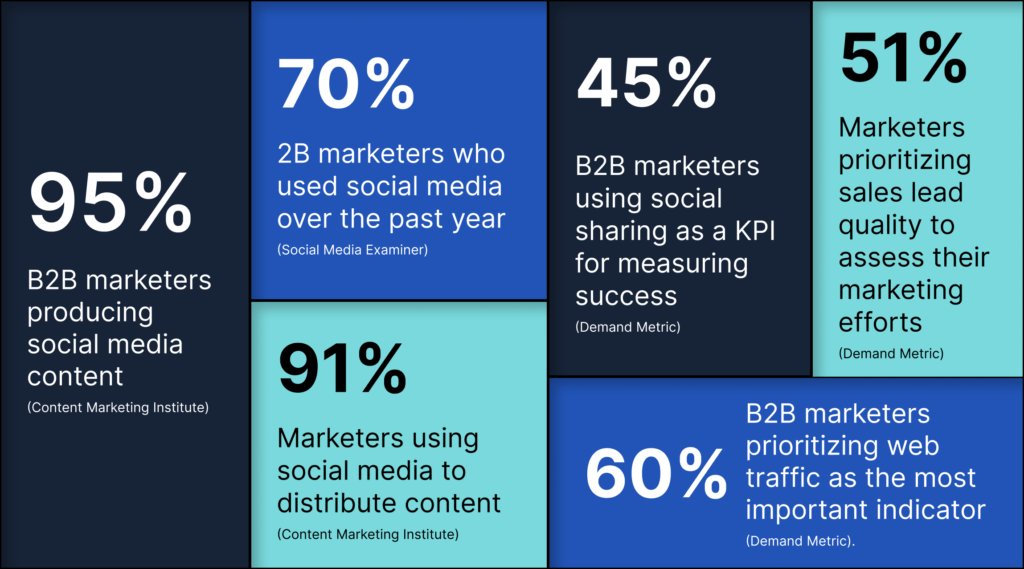
Social media has become a powerful tool for B2B engagement, driving brand awareness and lead generation. These latest stats illustrate its growing importance in the B2B space.
In 2024, social media continues to play a crucial role in B2B marketing strategies, offering unique opportunities for engagement and lead generation. Leveraging platforms like LinkedIn, X (Twitter), and Facebook, B2B marketers can reach more narrowly-defined targeted audiences, build brand authority, and foster meaningful relationships with potential clients and industry influencers.
- Social media ranks as the third most effective type of content utilized by B2B marketers in their content marketing strategies. (Content Marketing Institute).
- 95% of B2B marketers produce social media content and 91% use social media to distribute content (Content Marketing Institute).
- Sales improved for over 70% of B2B marketers who utilized social media over the past year (Social Media Examiner).
- 45% B2B marketers use social media sharing as a KPI for measuring the success of their marketing strategies. However, a larger portion, 60%, still consider web traffic to be the most important indicator, while 51% prioritize the quality of sales leads to assess their marketing effectiveness (Demand Metric).
More Stats and Trends
- Over the past 12 months, 90% of B2B marketers reported distributing content on social media platforms, making it the most popular distribution channel.(Content Marketing Institute)
- Social media is the top channel for both top-of-funnel and bottom-of-funnel goals, with 50% of B2B marketers favoring it for top-of-funnel and 46% for bottom-of-funnel, outperforming email and other channels. (Wpromote).
- LinkedIn is seen as the most valuable social media platform by 84% of B2B marketers.(Content Marketing Institute).
- Social media ranks third among the most effective content types used by B2B marketers, with 41% utilizing it in their content marketing strategies. (Content Marketing Institute).
- 45% of B2B marketers use social media shares to gauge the success of their marketing efforts. However, 60% still view web traffic as the gold standard, while 51% prioritize the quality of sales leads. (Demand Metric).
- Facebook remains the most widely used platform among both B2B and B2C marketing agencies. (Hootsuite).
B2B SEO and Search Marketing
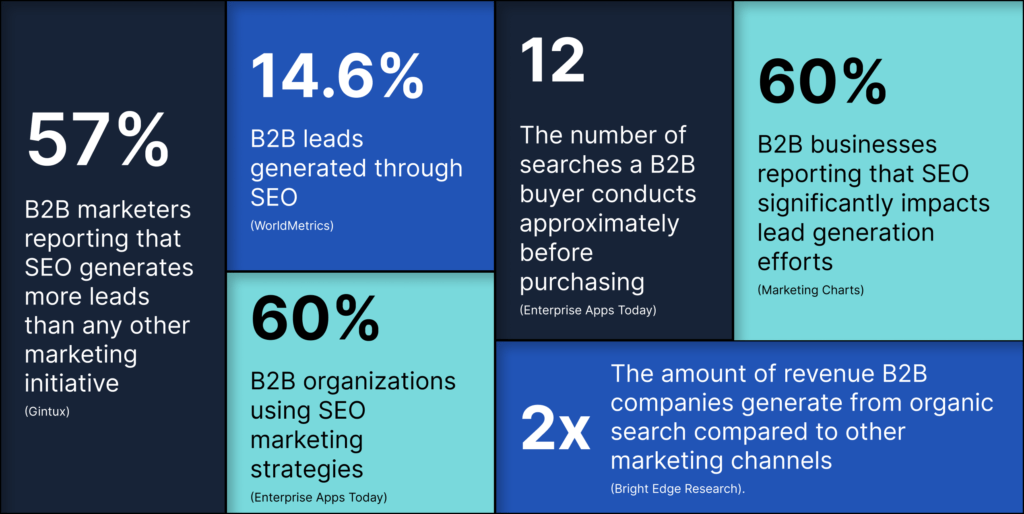
Search engine optimization is essential for B2B visibility and long-term success. Here are the most impactful trends that shape how businesses optimize for search and improve their rankings.
In 2024, Search Engine Optimization (SEO) and search marketing remain critical components of digital marketing strategies. SEO involves optimizing a website to improve its visibility in organic search engine results, while search marketing encompasses both SEO and paid search advertising, such as Pay-Per-Click (PPC) campaigns.
- According to a survey, 57% of B2B marketers report that SEO generates more leads than any other marketing initiative (Gintux).
- SEO drives 14.6% of all leads for B2B businesses (WorldMetrics)
- 60% of B2B organizations make use of SEO marketing strategies (Enterprise Apps Today).
- A potential B2B buyer conducts approximately 12 Google searches before making a purchase decision (Enterprise Apps Today).
- B2B companies generate twice as much revenue from organic search capturing prospects and generating leads from the website, compared to other marketing channels (Bright Edge Research).
- Nearly 60% of B2B businesses report that SEO significantly impacts their lead generation efforts (Marketing Charts).
More Stats and Trends
- In the U.S., internet search results are the leading source for product discovery among B2B buyers. Instead of depending on industry publications or trade shows, 66% of B2B buyers use search engines when researching products they intend to purchase. (Statista)
- SEO is the leading marketing tactic used by B2B companies, with 49% of surveyed B2B marketers incorporating it into their strategies, making it the most popular approach. (Sagefrog).
- B2B organizations dedicate approximately 15% of their marketing budget to SEO, surpassing investments in AI chatbots (12%) and video marketing (9%) (Sagefrog).
- According to Wpromote, 23% of B2B marketers identify organic search as the most effective channel for generating revenue.
- According to Wpromote, 19% of B2B marketers identify SEO as the top contributor to achieving top-of-funnel goals, such as increasing brand awareness and generating leads. This outpaces podcasts (16%) and converged TV (11%) as the most effective marketing tactic for these objectives.
- According to Gartner, 67.6% of organic online traffic comes from clicks on the top five search results.
The evolving B2B marketing landscape requires businesses to adapt quickly to digital strategies, content marketing, and AI-driven tools to stay ahead of the competition. Embracing these trends positions companies to optimize their sales cycles, create high-value content, and spur lead generation.
DBS Interactive can help B2B enterprises harness these insights and trends to reshape digital marketing strategies. Whether you aim to integrate advanced AI, enhance your content, or refine your online presence, our expertise will lead you to success, as it has for our clients.
Contact us today to schedule a free audit of your website and business goals.



